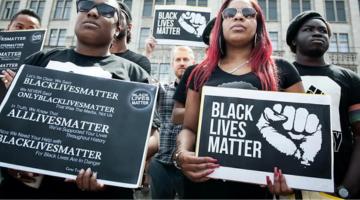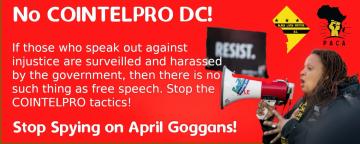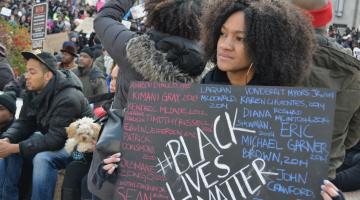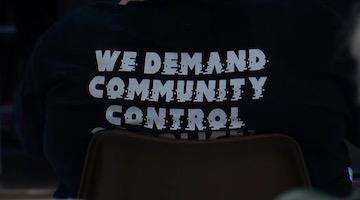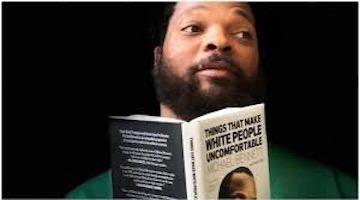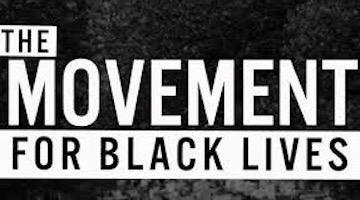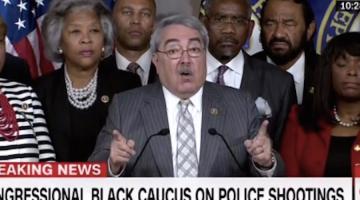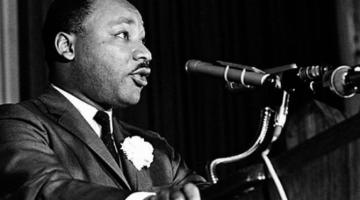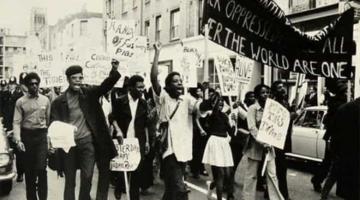Unapologetic lays out a case for the abolition of the prison industrial complex and a pathway towards transformation that is paired with accountability.
“I use a mixture of history, theory and my own experiences to weave together a vision of what our movements for collective liberation should look like.”
In this series, we ask acclaimed authors to answer five questions about their book. This week’s featured author is Charlene Carruthers. Carruthers is a strategist, writer and leading community organizer in today’s movement for Black liberation. Her book is Unapologetic: A Black, Queer, and Feminist Mandate for Radical Movements.
Roberto Sirvent: How can your book help BAR readers understand the current political and social climate?
Charlene Carruthers: Unapologetic asks all readers five critical questions: Who am I? Who are my people? What do we want? What are we building? Are we ready to win? The answers to each question not only helps us to understand the current political and social climate, they allow us to situate ourselves within it and advance our work for collective liberation. Unapologetic is written for anyone who is trying to make sense of the diversity of forces at play in a political and social climate ripe for sustained resistance and alternative building. Right now, our people are contending on terrain that is anti-Black, capitalist and patriarchal. And I believe that everyday people can understand complex topics because being Black in this world is full of complex experiences. Unapologetic lays out how systems of oppression impact the lives of Black people and the solutions our people have struggled to make real. I use a mixture of history, theory and my own experiences to weave together a vision of what our movements for collective liberation should look like.
What do you hope activists and community organizers will take away from reading your book?
My greatest hope is that activists and community organizers are both inspired and agitated while reading Unapologetic. That’s the work of effective organizing. If people read this book from cover to cover and only agree, I haven’t done my job. I want people to struggle with what they believe, how they learned it and how it relates to their work. I want people to take away more knowledge about the Black radical tradition (BRT) than they had before reading Unapologetic. That means that they situate radical Black feminisms and LGBTQ movements within the BRT. It also means that they will always ask questions that get us to a more complete story about where our people have been and where we are going. I lay out practical actions and argue for an approach that is grounded in the success and failures of our movements. I’ve seen what it looks like to organize through a Black queer feminist lense, and I know that our collective liberation is possible when we take up that approach to the work. I anchored the book in the mandate written by Mary Hooks, I want folks to take that seriously. Lastly, I want people to believe that they can write a book too. I did, so can you. It just takes rigor, discipline and clarity.
We know readers will learn a lot from your book, but what do you hope readers will un-learn? In other words, is there a particular ideology you’re hoping to dismantle?
Oh! There is always so much to unlearn about capitalism, anti-Blackness and patriarchy. I hope readers unlearn the belief that police keep us safe, just as much as I hope they unlearn that “race-only” strategies won’t save us. I’m looking to dismantle the idea that identity politics is the domain of shallow politics—instead I want everyone to understand the radical potential of a politic that is Black, feminist and queered. It is counterrevolutionary to marginalize any issue that systemically impacts Black people. It is counterrevolutionary to sideline understanding and actively combating anti-Blackness as the breeding ground for gender and sexual oppression. The habit of counterrevolutionary strategies and behaviors has to be unlearned across our movements, in our homes and our institutions. I use the stories of radical Black feminist and LGBTQ movements to advance our capacity to build and implement effective strategy—not for inclusion or diversity sake. There is so much to learn from the work led by radical Black trans women and Black lesbians across the globe. Why isn’t that work centered in the Black radical tradition? It should be. I understand that it may be uncomfortable for some people, but isn’t reading about the devastation of colonialism and chattel slavery uncomfortable? We have to learn and value the various contributions our people have made. We also have to unlearn the practice of expecting all things from our political homes, institutions and even our partners. That is the embodiment of organizing through a Black queer feminist lens. Self work is necessary within systems and cultures of community care. I discuss this extensively throughout the book as a pathway towards collective liberation. When people bring their entire selves into the work, they are also bringing their traumas. We have a duty as individuals to do self work. We have a duty as organizations and institutions to create containers for community care.
Who are the intellectual heroes that inspire your work?
There are so many people who inspire my work, and I find their intellect everywhere. Claudia Jones, Robin D.G. Kelley, Zora Neale Hurston, Cathy Cohen, Joseph Beam, Gwendolyn Brooks, bell hooks, Angela Davis, Steve Biko, Winnie Mandela, Audre Lorde, Barbara Ransby, Barbara Smith, my comrades in BYP100, I could go on and on. What is important to note is that intellect lives outside, inside and in between the academy. The academy lives inside, outside and in between the Black liberation movement. Black people have always done intellectual work. I wrote this book to encourage more radical activists and community organizers from my generation to write books. We need a canon produced from within this generation. I want more of us to write books, create films and write poetry. If you’ve been on the frontline of this work, physically or otherwise, doing work to genuinely liberate us all, know that you have something to offer. Future generations need you.
In what way does your book help us imagine new worlds?
I believe that understanding history, intellectual and grassroots organizing of the Black Radical Tradition helps us to imagine new worlds. Unapologetic tells a more complete story about the Black radical tradition. Within the stories I chose to include, readers will know more about the brilliance of our people and that our brilliance comes from movements that are often vilified or simply ignored. I anchor the “Case for Reimagining the Black Radical Tradition” chapter in the organizing led by Rosa Parks to secure justice for Recy Taylor. In 1944, a group of white men kidnapped and raped Mrs. Taylor. The campaign spread across the United States and the world. That story alone allows me to dig into what is possible when our people decide to take collective action. Additionally, Unapologetic lays out a case for the abolition of the prison industrial complex and a pathway towards transformation that is paired with accountability. I want to live in a world without cages—I want this because it has always been our people inside of them. I want nothing short of transformation. I want the transformation that began under Thomas Sankara’s leadership in Burkina Faso, I want the transformation Marsha P. Johnson demanded during the Stonewall Rebellion. I want thetransformation our ancestors dreamed of as they chose to live so that future generations could thrive. In knowing where our people come from, we can develop solid grounds for new worlds.
Roberto Sirventis Professor of Political and Social Ethics at Hope International University in Fullerton, CA. He also serves as the Outreach and Mentoring Coordinator for the Political Theology Network. He’s currently writing a book with fellow BAR contributor Danny Haiphong called American Exceptionalism and American Innocence: The Fake News of Wall Street, White Supremacy, and the U.S. War Machine.
COMMENTS?
Please join the conversation on Black Agenda Report's Facebook page at http://facebook.com/blackagendareport
Or, you can comment by emailing us at comments@blackagendareport.com

